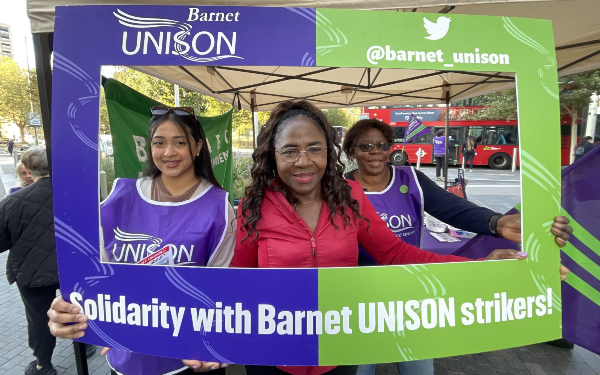
Social workers are being re-balloted on striking after 27 days of action over the past five months left their pay and staffing dispute unresolved.
UNISON members in Barnet council’s mental health teams are voting on further walkouts in pursuit of similar retention payments to those received by their children’s social worker counterparts in the borough.
Barnet UNISON said this was needed to tackle significant attrition from the council’s north and south mental health teams and its approved mental health professional (AMHP) service, claiming 20 staff had left the teams over the past 18 months.
Loss of staff ‘impacting on safety of service’
Though vacancy numbers were few, this represented a significant loss of experience, exacerbated by the council replacing three social worker roles with three non-qualified posts across the teams, said the union.
The staffing situation has affected the safety of the service, it added, claiming that maximum waiting time for an assessment on the north and south teams was now 17 months.
The union estimated that the strikes themselves had resulted in 4,050 lost contacts with service users.
Disparities in retention payments
Currently, the council offers children and families social workers annual retention payments of up to 25% of salary
The council has offered an additional £1,000 per year for the next two years to social workers, occupational therapists and team managers in adults’ services, including the mental health teams.
However, Barnet UNISON said this was worth an additional 2.5% of salary on average, well short of the 20% it is claiming for the mental health practitioners.
Barnet UNISON branch secretary, John Burgess, claimed the council had refused to negotiate.
He said there had been no talks since it lodged its notification to strike in September 2023, despite the union approaching employment relations body ACAS to mediate discussions in December.
Council has made ‘numerous offers to talk’
However, the council rejected this saying it had made “numerous offers to discuss the situation with Barnet UNISON and to explore a range of solutions”.
“Last year, in response to the situation, we made an offer of a £1,000 additional annual payment to all qualified adult social workers, occupational therapists, lead practitioners and team managers in all the teams in adult social care, over and above the mental health teams, but this was rejected by UNISON,” said a Barnet spokesperson.
“We stand ready to discuss matters further through ACAS.”
Pay rates ‘competitive’
The spokesperson added that the authority was “grateful to all our social workers for the vital work they do, supporting adults who draw on care and support”.
But they said that its pay rates for the social workers concerned were competitive, adding: “We have benchmarked our pay with other London councils and in particular, with other outer London boroughs.
“This shows our pay compares well to our peers. No council we have benchmarked with pays a recruitment and retention payment to its mental health social workers.
“All social workers who act as approved mental health professionals in Barnet are paid at the lead practitioner grade and this also compares well with other councils.”




 Bournemouth, Christchurch and Poole
Bournemouth, Christchurch and Poole  Hampshire County Council
Hampshire County Council  Lincolnshire County Council
Lincolnshire County Council  Norfolk County Council
Norfolk County Council  Northamptonshire Children’s Trust
Northamptonshire Children’s Trust  South Gloucestershire Council
South Gloucestershire Council  Wiltshire Council
Wiltshire Council  Wokingham Borough Council
Wokingham Borough Council  Children and young people with SEND are ‘valued and prioritised’ in Wiltshire, find inspectors
Children and young people with SEND are ‘valued and prioritised’ in Wiltshire, find inspectors  How specialist refugee teams benefit young people and social workers
How specialist refugee teams benefit young people and social workers  Podcast: returning to social work after becoming a first-time parent
Podcast: returning to social work after becoming a first-time parent  Podcast: would you work for an inadequate-rated service?
Podcast: would you work for an inadequate-rated service?  Family help: one local authority’s experience of the model
Family help: one local authority’s experience of the model  Workforce Insights – showcasing a selection of the sector’s top recruiters
Workforce Insights – showcasing a selection of the sector’s top recruiters 

 Facebook
Facebook X
X LinkedIn
LinkedIn Instagram
Instagram
Pay scales in virtually all areas of employment in the UK are way below what they should be, especially in areas of public services and in private employment areas where financing is from public areas.
In many areas, this public financing comes from Local Authorities, (LAs) who in turn are partly financed by the government and since 2010 these LAs have been seriously underfunded by the government and still are.
Many LAs are declaring bankruptcy, currently around 5 LAs and many others are very close to doing so.
So, my thoughts are with the social workers of London borough’s mental health teams, but they are one of many in all areas of LAs employment.
Some LAs may be and may have been less than prudent concerning finance, but the real culprits are the government and not just this government, but many previous governments both Labour and Tory.
The UK is in a mess it is because of many years of underinvestment and not just in public sectors but also in some private sectors too. Money by the government, LAs and others has been spent where it shouldn’t have been and not where it should have for many years, well before 2010, but 2010 till now has made serious problems much more serious.
But are lessons being learned, no and they never are, because to learn there has to be a willingness to learn and in the government this is embarrassing absent.
According to reports now, this government is considering reducing LA funding even more, perhaps, to fund some cuts in taxation which itself is extremely high.
Many in employment feel they have no option but to strike, but in doing so they are penalising people who have no power to give those underpaid more and will, in effect seriously affect people in the UK who have less than nothing, the poor, disabled and vulnerable.
What is the answer, well getting a government that cares, but after all these years that appears to be an impossibility and I feel the next government will be just as bad, no matter what they say.
But, really it is not just the UK as some world events do have some play in these circumstances, but that doesn’t solve the problems of lower pay and chronic underinvestment in the UK.
Anywhere you look there is chronic underinvestment in rail, road, water, energy, environment and many others.
Some in the UK are well-paid, CEOs of large organisations, high-end legal professionals, and for what they do or more importantly what they don’t do Government Ministers and MPs.
Wealth in the UK needs to be distributed better, but if it is then those who are wealthy could just leave the UK for they have the wealth and power to do so and the poor, disabled and vulnerable will never be able to do so. So, those whose needs are not being catered for will always be cast aside and unfortunately striking just adds to this.
So, there has to be a better way to obtain what is required so that all benefit more equally and effectively and that can only be done by everyone being less selfish and everyone in the UK be there for everyone.
It is what a democracy should be, but in the process of time and events occurring democracy has been cast aside to a large degree, but we still say we are a democratic country, which in many ways we aren’t.
We distrust all around us and this is one of the problems, but those in power have acted against us for years and so distrust has forever been increasing. Has there ever been trust, well who knows, perhaps there could have been in the being of time, but that was many centuries ago.
Of all the areas of ruling perhaps the concept of communism comes closest, however, when the human element becomes involved even in communism there are the elites the ones who have been allowed to gain power and with the power they then use that power to gain wealth. Just look at the dictators in the communist countries for they are all extremely wealthy and so powerful until they are deposed. Then those who are deposed then take the power and gain the wealth, a neverending event.
None of this gets better wages for those on low pay rates, so should there be compulsory arbitration and the outcomes have to be accepted by all concerned parties?
I may not really understand, but why in many organisations are pay negotiations done separately for different categories of employees, surely one pay scale should be there for everyone. When I say everyone, I mean everyone from the people at the top to those at the bottom. Why should a CEO be treated differently than those on lower rates of pay? Surely that would be true equality.
Say in the NHS one pay rate negotiation for every employee and not different for Consultants, Junior doctors, Nurses, clerical, cleaners, technicians and others. Similar for LAs and others.
In doing so, the government needs to create a starting pay rate for everyone so that the least paid can live reasonably which no one can on the National Living Wage and maybe not even the Real Living Wage. Have welfare benefits that are realistic and not demeaning which they are currently and taxation which is creating more equality.
If a Living Wage is what it is believed that people need to live on, then why is it reduced by applying income Tax to it, surely the tax-free allowance should always be the Living Wage, otherwise, it is not living for those on this minimum level of pay.